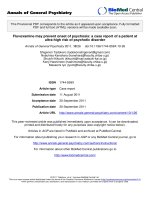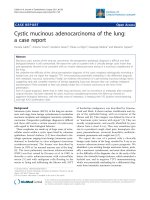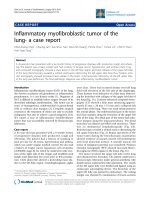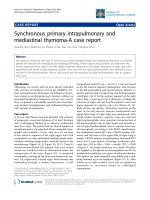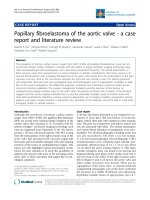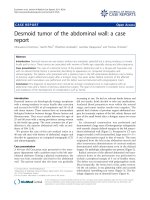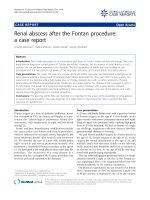Báo cáo y học: " Cytomegalovirus colitis after systemic chemotherapy in a patient with recurrent colon cancer: A case report" pot
Bạn đang xem bản rút gọn của tài liệu. Xem và tải ngay bản đầy đủ của tài liệu tại đây (758.42 KB, 3 trang )
BioMed Central
Page 1 of 3
(page number not for citation purposes)
Journal of Medical Case Reports
Open Access
Case report
Cytomegalovirus colitis after systemic chemotherapy in a patient
with recurrent colon cancer: A case report
Fuminori Teraishi*
1
, Hiroshi Shimamura
1
, Takeo Suzuki
1
,
Masako Nakamoto
1
, Akira Chikuba
1
, Masashi Nezu
1
, Shun Kohsaka
2
,
Takao Takiue
1
and Hiroshi Chikuba
1
Address:
1
Chikuba Hospital for Gastrointestinal and Colorectal Surgery, Kurashiki 710-0142, Japan and
2
Division of Cardiology, Columbia
University, College of Physicians and Surgeons, New York, NY 10032, USA
Email: Fuminori Teraishi* - ; Hiroshi Shimamura - ; Takeo Suzuki - ;
Masako Nakamoto - ; Akira Chikuba - ; Masashi Nezu - ; Shun Kohsaka - ;
Takao Takiue - ; Hiroshi Chikuba -
* Corresponding author
Abstract
Introduction: The occurrence of cytomegalovirus colitis is well known in immunosuppressed
patients, such as neoplastic patients following chemotherapy, although its exact etiology remains
unclear.
Case presentation: We present a case of cytomegalovirus colitis occurring in a 77-year-old man
with vomiting and diarrhea 2 weeks after initial systemic chemotherapy consisting of 5-fluorouracil,
leucovorin and irinotecan for a recurrent colorectal cancer. Initial colonoscopy revealed multiple
punched-out ulcers in the transverse colon and the diagnosis of cytomegalovirus was based on
positive cytomegalovirus antigen detected by indirect enzyme antibody method, although
immunohistological examination of tissues biopsied at colonoscopy was negative. The symptoms
ceased under ganciclovir and octreotide treatment, and the patient recovered gradually.
Conclusion: The most probable cause of the cytomegalovirus colitis in this case was impaired
immunity following chemotherapy. Cytomegalovirus infection should be included in the differential
diagnosis of gastrointestinal disease in colorectal cancer patients after chemotherapy and, when
suspected, the clinician should pursue appropriate diagnostic interventions including colonoscopy.
Introduction
Recently, a number of new treatment options have
become available for colorectal cancer (CRC) patients. In
particular, CPT-11 (irinotecan), a specific inhibitor of
topoisomerase I, has been proven to have efficacy in the
treatment of CRC. Most recent studies have demonstrated
a significant improvement in the addition of irinotecan to
5-fluorouracil (5-FU)-leucovorin (LV) combination ther-
apy (FOLFIRI) for patients with 5-FU-refractory advanced
CRC. In contrast, immunosuppression induced by chem-
otherapy is less well characterized, with opportunistic
infections appearing mainly after high-dose treatment or
with certain new drugs directly affecting lymphocyte
homeostasis. The occurrence of cytomegalovirus (CMV)
colitis is well known in immunosuppressed patients, such
as neoplastic patients after chemotherapy, although its
Published: 28 August 2008
Journal of Medical Case Reports 2008, 2:289 doi:10.1186/1752-1947-2-289
Received: 30 October 2007
Accepted: 28 August 2008
This article is available from: />© 2008 Teraishi et al; licensee BioMed Central Ltd.
This is an Open Access article distributed under the terms of the Creative Commons Attribution License ( />),
which permits unrestricted use, distribution, and reproduction in any medium, provided the original work is properly cited.
Journal of Medical Case Reports 2008, 2:289 />Page 2 of 3
(page number not for citation purposes)
exact etiology remains unclear. We describe the case of a
77-year-old man presenting with an unusual viral compli-
cation with CMV colitis diagnosed 2 weeks after a first
course of standard chemotherapy for a recurrent CRC.
Case presentation
A 77-year-old man with known recurrence of colon can-
cer, which was not previously treated with any adjuvant
chemotherapies, was admitted for vomiting and diarrhea
2 weeks after standard FOLFIRI chemotherapy consisting
of 5-FU (350 mg/bolus/m
2
plus 2300 mg/infuser pump/
m
2
), LV (200 mg/m
2
) and irinotecan (130 mg/m
2
). Labo-
ratory examination on admission showed a white blood
cell count of 15,300/mcl and C-reactive protein of 16.4
mg/dl, and he was also slightly anemic. Blood, urine and
stool cultures as well as Clostridium difficile toxin 33
assay for stool specimen results were negative.
Abdominal computed tomography imaging revealed a
massive dilatation of the entire colon (Figure 1). Subse-
quently, a colonoscopy was performed, which revealed
multiple punched-out ulcers in the transverse colon (Fig-
ure 2A and 2B) typical for CMV colitis. Following colon-
oscopy, CMV antigen was detected by indirect enzyme
antibody method, also known as antigenemia method,
but the biopsy specimens did not reveal CMV inclusion
body immunohistologically. Based on these findings, the
patient was diagnosed with CMV colitis and was started
on intravenous ganciclovir therapy (500 mg/day for 2
weeks) combined with subcutaneous octreotide (200
mcg/day for 10 days). The patient gradually improved,
and a second colonoscopy 4 weeks after admission dem-
onstrated partial healing of multiple ulcers in the trans-
verse colon (Figure 3).
Discussion
Although CMV colitis is not frequently encountered,
severe CMV colitis has been reported in neoplastic
patients after chemotherapy [1,2]. The diagnosis of CMV
colitis often poses a clinical challenge. Although endo-
scopic biopsies taken from the mucosa and ulcer bed are
a relatively rapid and reliable method for demonstrating
CMV colitis, their sensitivity is sometimes limited [3].
CMV antigen in the blood may also confirm the diagnosis
of CMV colitis [1] as in this case but may not always be
present. Furthermore, the clinical symptoms of CMV coli-
tis are indistinguishable from irinotecan-induced enteri-
Abdominal computed tomography shows massive large bowel dilatation of the entire colonFigure 1
Abdominal computed tomography shows massive
large bowel dilatation of the entire colon.
Initial colonoscopy reveals multiple punched-out ulcers of the right transverse colon (A) and the left transverse colon (B) with minimal granularity in the surrounding mucosaFigure 2
Initial colonoscopy reveals multiple punched-out
ulcers of the right transverse colon (A) and the left
transverse colon (B) with minimal granularity in the
surrounding mucosa.
a
b
Journal of Medical Case Reports 2008, 2:289 />Page 3 of 3
(page number not for citation purposes)
tis, another infrequently seen but important cause of
severe colitis [4,5].
In our case, since the CMV antigen was positive, it is
unlikely that the patient's colitis was directly related to the
use of irinotecan, but the high-dose irinotecan may have
been the major predisposing factor for the activation of
CMV. Moreover, although it has been reported that iri-
notecan has the potential to induce neutropenia [5], our
case showed an elevation of the leukocyte count, presum-
ably caused by the colitis itself and the micro-abscesses.
The primary therapy for CMV colitis is the use of antiviral
drugs such as ganciclovir. In addition, previous reports
have shown that octreotide also has potential for use
against CMV colitis, although its mechanism of action
remains unclear [2,6]. Our case demonstrated a favorable
response to these treatments. Despite successful treat-
ment, elective surgery is warranted if intestinal stenosis
develops after the punched-out ulcer has healed [7].
Although the overall frequency of CMV infection in
patients with neoplasm after chemotherapy is uncertain,
CMV colitis should be ruled out with colonoscopy if the
patient is suspected of having atypical enteritis after chem-
otherapy, as demonstrated in our case.
As the clinical pathological features of CMV colitis and
inflammatory bowel disease often overlap, and because of
the possible co-existence of CMV colitis with idiopathic
colitis, the possibility of CMV infection should always be
considered, so that the most appropriate therapy can be
instituted for these patients.
Conclusion
This case demonstrates that CMV colitis appears to be an
extremely rare but potentially serious complication for
patients with CRC following chemotherapy. Therefore, in
individuals with CRC who do not respond to traditional
medical therapy, other diagnoses including CMV should
be considered, with early examinations of colonoscopy
with biopsy and CMV antigenemia.
Abbreviations
CMV: cytomegalovirus; CRC: colorectal cancer; FOLFIRI:
folinic acid (leucovorin) fluorouracil (5-FU) irinotecan
(CPT-11); LV: leucovorin; 5-FU: 5-fluorouracil.
Competing interests
The authors declare that they have no competing interests.
Consent
Written informed consent was obtained from the patient
for publication of this case report and accompanying
images. A copy of the written consent is available for
review by the Editor-in-Chief of this journal.
Authors' contributions
FT summarized the case and designed and drafted the
manuscript. HS, TT, and HC participated in the design
and coordination of the manuscript. SK initialized the
case report and helped to prepare the manuscript. TS, MN,
AC, and MN read and approved the final manuscript.
References
1. Matthes T, Kaiser L, Weber D, Kurt AM, Dietrich PY: Cytomegalo-
virus colitis: a severe complication after standard chemo-
therapy. Acta Oncologica 2002, 41:704-706.
2. Nomura K, Kamitsuji Y, Kono E, Matsumoto Y, Yoshida N, Konishi
H, Horiike S, Okanoue T, Taniwaki M: Severe cytomegalovirus
enterocolitis after standard chemotherapy for non-Hodg-
kin's lymphoma. Scand J Gastroenterol 2005, 40:604-606.
3. Nishimoto Y, Matsumoto T, Suekane H, Shimizu M, Mikami Y, Iida M:
Cytomegalovirus infection in a patient with ulcerative colitis:
colonoscopic findings. Gastrointest Endosc 2001, 53:816-818.
4. Sears S, McNally P, Bachinski MS, Avery R: Irinotecan (CPT-11)
induced colitis: report of a case and review of Food and Drug
Administration MEDWATCH reporting. Gastrointest Endosc
1999, 50:841-844.
5. Fuchs C, Mitchell EP, Hoff PM: Irinotecan in the treatment of
colorectal cancer. Cancer Treat Rev 2006, 32:491-503.
6. Andrews CN, Beck PL: Octreotide treatment of massive hem-
orrhage due to cytomegalovirus colitis. Can J Gastroenterol
2003, 17:722-725.
7. Albu E, Mukherjee A, Rao D, Sehonanda A, Pai BN, Gerst PH: Emer-
gency surgery for generalized peritonitis caused by cytome-
galovirus colitis in a patient with AIDS. Am Surg 1999,
65:397-398.
Follow-up colonoscopy demonstrates partial healing of the ulcers in the transverse colonFigure 3
Follow-up colonoscopy demonstrates partial healing
of the ulcers in the transverse colon.
